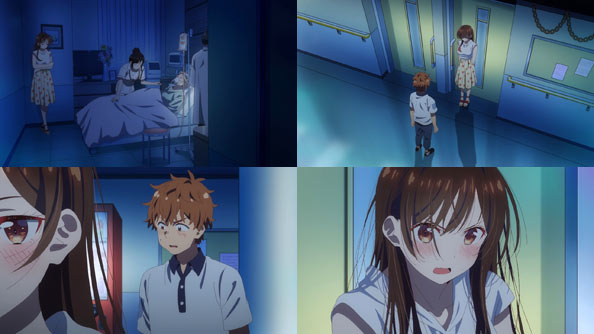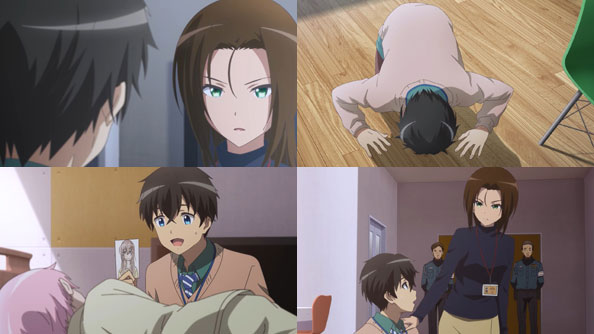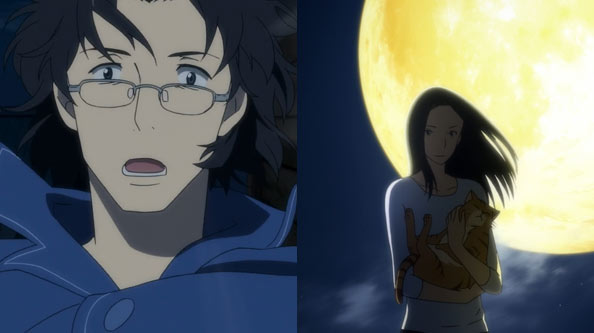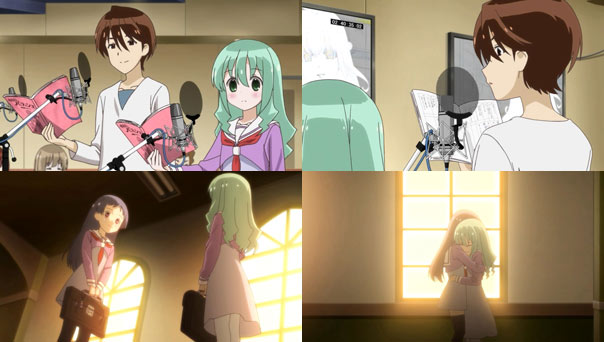I’ll admit it, like I always do: this episode got me. I was lucky enough to know all four of my grandparents when they were strong and full of life, but also when they were weak and passed on. Anyone who has experienced a grandparent (or anyone, really) passing away would be able to relate to Chizuru’s situation.
Just when she felt like she wasn’t quite “good enough” to shine on the screen for her granny, Kazuya barges in, but only to silently set up a projector and laptop so Granny Sayuri can watch, or at least listen, if she can hear. Chizuru was mired in the depths of despair, but Kazuya gave her one last chance to fulfill her dream.
Sayuri is incredibly weak at this point, but she’s still able to open her eyes for about ten minutes of the film. However much else of the film she’s able to hear, we’ll never know, but we do know that she hears Chizuru crying as she’s suddenly unsure whether to tell her the truth or not.
Part of Chizuru knows she’ll regret telling Sayuri, as it feels like she’s only doing it to make herself feel better, and it would let her down in her final moments. But she’ll also regret not telling her. She’s stuck in a state of indecision, but in one more show of strength, Sayuri lifts her hand and places it on Chizuru’s cheek to comfort her.

When Chizuru comes out and says she lied to her, Sayuri says she’s similarly unsure of whether she wants to know or not know. But she wants Chizuru to know that whether she tells her or not, she’ll accept it. She says that our lives our 99% lies and 1% truths, but she’s proud of what a strong and fine young woman her granddaughter has become; a woman capable of searching for those rare truths.
In the end, Chizuru doesn’t come right out and say she and Kazuya aren’t a real couple. Instead, she lets her gran say the things she needs to say with her final breaths: she was so beautiful in the film, and she loves her very much. Chizuru reciprocates, and embraces Sayuri as she passes away. Folks, this scene wrecked me. Many tissues were spent.
We transition to the next day or so, when Kazuya informs Mini of Sayuri’s passing. Mini’s cartoonish bawling almost felt out of place, but she’s genuinely grieving. She also rejects Kazuya’s feeling that perhaps Chizuru is strong enough to get through this and live her life all alone. She may indeed be strong, but as Mini says, “No woman is an island.”
Kazuya’s last interaction with Chizuru was to ask her if she was okay, after she told him to go home and rest up and walked away. She only turned around once, with her brightest Rent-a-Girlfriend smile, and said “I’m fine.” But she really wasn’t fine, and Kazuya should have known that.
Kazuya cleans up for the wake, to which his own grandmother accompanies him, as she and Sayuri were best friends. She addresses Chizuru on behalf of Kazuya and formally offers her condolences for her loss. Chizuru is calm, collected, and keeping it together, but one can still sense the searing pain just below the surface.

Kazuya’s gran doens’t spend long in front of Sayuri’s grave, surprising him as he assumed she’d make a bit ruckus bawling. She says she doesn’t want to be a bother, and will also see Sayuri again before long. She then tells Kazuya to figure out what it is only he, her boyfriend, can do for Chizuru.
They leave without speaking to Chizuru again, but back home, Kazuya wrestles with his dilemma. He assumes Chizuru only sees him as just a neighbor, especially now that the film production is over. But he’s selling himself short. He’s become much more than that to her, even if they’re not “officially” girlfriend and boyfriend. Hopefully he heeds Mini and his granny’s words and realizes that soon.


















































